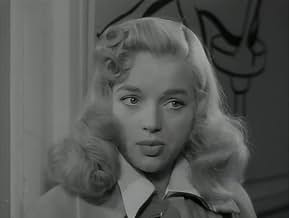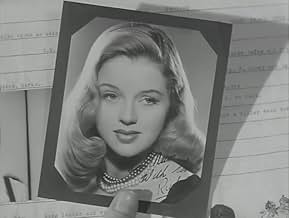The married owner of a bookstore is attracted to his sexy blonde clerk. He finally gives in to temptation and makes a pass at her, but that only results in him getting enmeshed in blackmail ... Read allThe married owner of a bookstore is attracted to his sexy blonde clerk. He finally gives in to temptation and makes a pass at her, but that only results in him getting enmeshed in blackmail and murder.The married owner of a bookstore is attracted to his sexy blonde clerk. He finally gives in to temptation and makes a pass at her, but that only results in him getting enmeshed in blackmail and murder.
- Director
- Writers
- Stars
- Bank Clerk
- (scenes deleted)
- Miss Rosetti
- (uncredited)
- Mary Lewis
- (uncredited)
- May Harman
- (uncredited)
- Police Constable
- (uncredited)
- Club Manager
- (uncredited)
- Frank the Waiter
- (uncredited)
- Tobacconist Customer
- (uncredited)
- Director
- Writers
- All cast & crew
- Production, box office & more at IMDbPro
Featured reviews
In a moment of weakness, Brent commits a minor indiscretion with Dors, for which he is profusely apologetic. The matter seems closed until the voluptuous sales girl informs love interest, Peter Reynolds, whose leering, smug, self-satisfied facial expression seems to be constantly inviting.....a deftly aimed fist, to at least temporarily wipe off that nauseating smirk! It is a measure of his despicable character, that rather than being the jealous lover, '£' signs light up in his eyes and he manipulates the naive Dors along a path of extortion and blackmail towards her boss.
A murder on the premises and the accidental, but mysterious death of his wife makes Brent the target of an intense police investigation and he receives little sympathy or support from the humorless Huntley. In what begins to play out like Phase two of 'The Phantom Lady', it's left to the doting and devoted Chapman to clear Brent's name, even at the risk of endangering her own life.
In an era of movie making when justice had to be seen to be done, it's unsurprising that 'The Last Page' concludes with a long sentence. The film is hardly overflowing with novel ideas, but there is sufficient action between the covers to maintain interest.
None of the films are of the front rank, being issued originally on the bottom half of double bills. Hammer may not have established itself as a memorable producer of noir on the basis of this transatlantic deal, but the results have been unfairly neglected (being the basis of only a passing reference in the official history of the studio for instance).
Criticism of the films, apart from focusing on their small budgets and hand-me-down leads, has generally dwelt on the success or otherwise of transplanting an American hardboiled genre into a different soil. Certainly the first of those made under the new arrangement The Last Page (aka: Man Bait, 1952) is example. Far too genteel to be successful as more than a mildly suspenseful thriller, its impact is further affected by the unassuming performance of lead George Brent - an actor whom Betty Davies apparently liked as a partner on screen as it was so easy to steal the picture from him! Brent plays the manager of a bookshop, hardly the first choice for a thriller/ noir setting (although one makes a memorable appearance in The Big Sleep) who is blackmailed by the bad blonde of the title - no less than Diana Dors, an early screen role. It was an early credit too for one of Hammer's best directors Terence Fisher, though again this critic, at least, thinks he remains a minor talent. Like practically all the Hammer films in this series, the title was changed for the American market and 'Man Bait' certainly sounds more the job for the pulp world that the films inhabit. It also places Dors firmly at the centre of this film with a fine sense of atmosphere - having worked in the book trade for some years I found the dated interiors and procedures especially fascinating - while some other, equally effective location shooting amidst a now-lost London adds to the charm.
The proprietor of this bookstore is, of all people, George Brent. He had a long career. Though this is a noir of sorts and I therefore can't give it a bad rating, let's just say this is hardly a career highlight for him.
Marguerite Chapman is attractive and convincing as his employee. She's stylish and pretty and comes off as nice.
This is an early Diana Dors film. She's decent in it. She gets pulled into some very bad behavior. But she's not a truly terrible character. She's chronically late to work and weak willed.
This isn't a memorable or distinguished film. But it isn't terrible, either. Nor does it hold to any formula. It's mediocre in a unique way.
Did you know
- TriviaThis was the first of 29 Hammer films directed by Terence Fisher over the course of 22 years. The last was Frankenstein et le Monstre de l'enfer (1974).
- GoofsHarmon says "goodbye" to the other person on the phone when he's put the handset almost back on the cradle, well away from his mouth.
- Quotes
Ruby Bruce: I'm sorry, but, I tore my sleeve.
Jeffrey Hart: How did that happen?
Ruby Bruce: I had to work late with my boss. I got a bit manhandled.
Jeffrey Hart: Manhandled?
Ruby Bruce: He's never seen me in my party clothes before. I think the shock was too much for him.
- ConnectionsFeatured in Les Archives de la Hammer: Chiller (1994)
- How long is Man Bait?Powered by Alexa
Details
- Release date
- Country of origin
- Official sites
- Language
- Also known as
- Man Bait
- Filming locations
- Production company
- See more company credits at IMDbPro
- Runtime1 hour 24 minutes
- Color
- Aspect ratio
- 1.33 : 1
Contribute to this page

































